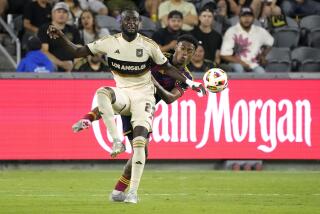Gold Reaches New High in L.A.
- Share via
The rain creates a drumbeat on the tent roof.
The engine noise and exhaust fumes from the team buses parked outside flood in through the open flaps.
Television cameras and microphones are thrust forward and questions are shouted--in a torrent of Portuguese, English and Spanish.
Through it all, Mario Jorge Lobo Zagalo remains silent, a half-smile playing at the corners of his mouth, his eyes crinkled in mirth.
Finally, some semblance of quiet is achieved. Finally, the respect that is due a person associated with four world championship teams is accorded him.
Zagalo has the smile of a wolf who has just raided the sheep.
Brazil 4, El Salvador 0.
Edmundo struck first, Romario followed suit and Elber sent the rest of the flock bleating into the night in terror.
After two lackluster matches in Florida--a 0-0 tie against fellow World Cup finalist Jamaica and a startling 1-1 tie against upstart Guatemala--the knives were out for Zagalo.
How could the world champions play this poorly? What was the coach thinking? Why was Brazil even taking part in the Gold Cup, an event devoid of a true world power such as Argentina or Germany or England or Italy?
These are curious days for the defending world champions. Playing in a tournament that, to them at least, is essentially meaningless, they nevertheless are expected to play the jogo bonito, or beautiful game, that their fans demand.
That is not always possible when such outstanding players as Ronaldo, Roberto Carlos, Leonardo, Aldair and Juninho, to mention only a handful, are not available.
But the intricate passing game, the sudden changes of pace and direction, the unexpected and the improvisational, the tricks that are their trademark, these are still expected.
Brazil 4, El Salvador 0.
That answered the critics. Not in full, but enough to keep the media hounds from Rio de Janeiro and Sao Paulo at bay.
And so Zagalo smiled.
Only a few days earlier, in Miami, the man who won the World Cup with Brazil as a player in 1958 and 1962, as a coach in 1970 and as technical director in 1994, had been in a surly mood.
“This isn’t the true Brazilian team,” he snapped after the Guatemala fiasco.
Now, in the tent in the tunnel in the Los Angeles Coliseum, Zagalo was in a fine mood.
Brazil 4, El Salvador 0.
It was the Brazilian players’ will, he said, to erase the memory of the previous two games, and the Central Americans had paid the price.
Why had the goals not come before?
“I don’t have a crystal ball,” Zagalo replied. “Today we played 15 minutes of marvelous football, and that ended the game.”
Almost, but not quite.
Elber still had a point to make. Sent on as a substitute for Edmundo with only nine minutes left in the game, the German-based striker from Bayern Munich scored twice within three minutes.
His second goal, Brazil’s fourth, had Zagalo beaming on the bench.
Salvadoran defender Vladan Vicevic tried to head the ball back to his goalkeeper, Elber intercepted it and, instead of turning to shoot, he back-heeled the ball into the net from 10 yards or more, catching the goalkeeper completely by surprise.
“I couldn’t miss the goal,” Elber said. “By playing it that way, it made it difficult for the goalkeeper. It was the best way to score the goal and also the most beautiful.”
At this point Zagalo interrupted.
“Brazil has art in its game,” he said. “It has a touch of magic that no other team has. It is an extra weapon we have and we use it.
“Elber scored the goal this way not to make fun of the goalkeeper, not to embarrass him, but because it was the most efficient way [to score] and the most natural way.”
These are Brazilian soccer terms--art, beauty, efficiency and naturalness. Jogo bonito. The beautiful game.
Lobo was not originally part of Zagalo’s name. It was a nickname bestowed on him years ago. He made it his own.
Even a wolf can smile, but when it does, watch out.
Brazil 4, El Salvador 0.
More to Read
Go beyond the scoreboard
Get the latest on L.A.'s teams in the daily Sports Report newsletter.
You may occasionally receive promotional content from the Los Angeles Times.






